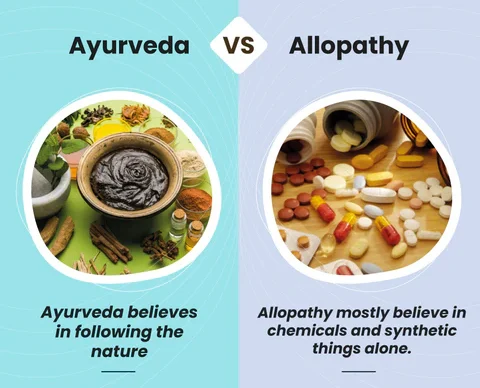The debate of Ayurveda vs. Allopathy continues to spark conversations among healthcare enthusiasts. Ayurveda, rooted in ancient Indian traditions, emphasizes holistic healing and balance. On the other hand, Allopathy, often termed as modern medicine, focuses on symptom-based treatment with scientifically tested methods.
Choosing between the two can be daunting, especially when both have proven benefits. Let’s dive deeper into their principles, advantages, and how they can complement each other for your overall well-being.
What Is Ayurveda?
Ayurveda, often called the “science of life,” dates back over 5,000 years. It is based on the belief that health is achieved by balancing the three doshas: Vata, Pitta, and Kapha. Ayurvedic treatments typically involve:
- Herbal medicines
- Dietary guidelines
- Yoga and meditation
- Detoxification techniques
Key Benefits of Ayurveda:
- Holistic approach to healing
- Minimal side effects (natural ingredients)
- Long-term wellness strategies
What Is Allopathy?
Allopathy, or modern medicine, uses scientifically researched treatments to address specific health issues. It relies on:
- Diagnostic tools (e.g., X-rays, MRIs)
- Medications backed by clinical trials
- Surgical interventions for critical conditions
Key Benefits of Allopathy:
- Rapid relief from symptoms
- Effective for acute and life-threatening conditions
- Continuously evolving with medical research
Ayurveda vs. Allopathy: Key Differences
| Aspect | Ayurveda | Allopathy |
|---|---|---|
| Approach | Holistic and preventive care | Symptomatic and targeted |
| Focus | Balancing body and mind | Treating specific illnesses |
| Duration | Long-term lifestyle changes | Short-term immediate relief |
| Side Effects | Minimal (natural ingredients) | Possible side effects of drugs |
| Philosophy | Root-cause treatment | Symptom management |
Can Ayurveda and Allopathy Work Together?
Rather than choosing one over the other, integrating Ayurveda and Allopathy could offer the best outcomes. For instance:
- Chronic Illnesses: While Allopathy provides immediate symptom management, Ayurveda can address the root cause.
- Post-Surgery Recovery: Ayurvedic practices like meditation and herbal supplements can accelerate healing and reduce stress.
- Everyday Wellness: Use Ayurveda for preventive care and Allopathy for acute health issues.
Outbound Link Suggestion: For more on combining healthcare systems, refer to the World Health Organization’s guidelines on traditional medicine.
The Role of Science in Both Systems
One of the primary criticisms of Ayurveda is its lack of extensive scientific validation compared to Allopathy. However, modern researchers are now exploring Ayurvedic formulations, leading to greater acceptance of herbal remedies worldwide.
Similarly, Allopathy evolves constantly with rigorous scientific studies and innovations. The complementary use of both systems provides a promising avenue for future healthcare solutions.
When to Choose Ayurveda vs. Allopathy
- Ayurveda is ideal for:
- Managing chronic conditions like diabetes and arthritis
- Enhancing mental well-being through yoga and meditation
- Detoxifying the body and mind
- Allopathy is ideal for:
- Emergency treatments (e.g., heart attacks, infections)
- Diagnosing and managing critical illnesses
- Surgery and advanced treatments

Conclusion: Which Is Better?
The question of whether Ayurveda is better than Allopathy does not have a definitive answer. Both systems have their strengths and limitations. Ayurveda is unparalleled in its holistic approach and long-term wellness focus, while Allopathy excels in immediate and life-saving interventions.
Instead of viewing them as opposites, consider how they can complement each other. Consult healthcare professionals to determine the best approach for your unique needs.
For personalized Ayurvedic advice, check out our resources on Jeevan Jyoti Ayurveda’s blog.
